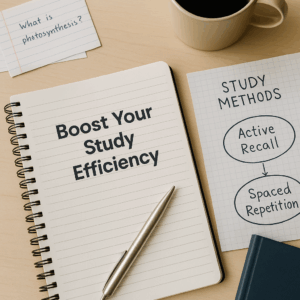💬 Introduction
Boost your study efficiency by 200% — not by spending more time, but by mastering the science of learning.
Most students grind for hours yet retain little. The truth? Productivity isn’t about working harder; it’s about working smarter.
After testing dozens of study methods—from classical note-taking to neuroscience-backed frameworks—I discovered that true efficiency lies in psychology, rhythm, and environment.
In this guide, we’ll break down eight proven learning strategies that will help you study smarter, focus deeper, and remember longer—without burning out.
🎯 1. Focus on Deep Work, Not Busy Work
In the age of distractions, focus has become your greatest competitive advantage.
Cal Newport’s concept of Deep Work shows that uninterrupted, intense focus can achieve more in 3 hours than scattered studying in 10.
How to apply it:
Study in 50-minute “focus blocks” with 10-minute breaks.
Turn off all notifications—yes, all of them.
Create a mental “focus trigger” like coffee, white noise, or lo-fi music.
💡 Pro Tip: Three deep work sessions a day will outperform any marathon study session filled with multitasking.
🧠 2. Use Active Recall & Spaced Repetition
Rereading notes feels productive but is one of the weakest learning methods.
Active recall—testing yourself without looking—and spaced repetition—reviewing at intervals—form the foundation of long-term retention.
Tools to try:
🧩 Anki or Quizlet for flashcards
🗣 The Feynman Technique: explain concepts as if teaching a beginner
🧾 Mini self-quizzes after each study block
✨ Result: You’ll cut study time in half and remember twice as much.
⚡ 3. Build a Routine Around Your Energy Levels
Peak productivity happens when your study schedule matches your energy rhythm.
Track your focus for a week and structure sessions around when your brain performs best:
🌅 Morning: Deep analysis, logical tasks
🌞 Afternoon: Light review, summarization
🌙 Evening: Reflection, testing, or creative synthesis
💡 Once you align your study times with your natural focus curve, efficiency doubles effortlessly.
🌿 4. Create a Distraction-Free Environment
Your space silently shapes your behavior. A cluttered desk equals a cluttered mind.
Optimize your setup:
Minimalist desk—only essentials in sight
Natural lighting and ergonomic chair
Apps like Forest or Freedom to block digital distractions
💬 Pro Tip: Use one space only for studying. This trains your brain to associate that environment with focus mode instantly.
🎯 5. Leverage Micro-Goals for Motivation
Big goals overwhelm. Small goals build momentum.
Instead of vague tasks like “Study chemistry,” set specific, trackable micro-goals:
✅ Example: “Review 2 chapters of biology and summarize 10 key insights.”
Each micro-goal completed releases dopamine—a reward signal that fuels consistency and motivation.
🎨 6. Mix Visual, Auditory, and Kinesthetic Learning
Your brain retains best when it learns in multiple ways. Combine sensory inputs to make memories stick.
Try this mix:
🖼 Visual: mind maps, diagrams, color-coded notes
🎧 Auditory: podcasts, recorded lectures, reading aloud
✋ Kinesthetic: teaching others, writing summaries by hand
As a result, your brain builds multiple “anchors” to recall information effortlessly.
💤 7. Prioritize Sleep, Nutrition, and Movement
You can’t study efficiently if your body is exhausted.
Your brain’s memory and focus functions depend on oxygen, nutrients, and rest.
Non-negotiables:
7+ hours of consistent sleep
Hydration and omega-3-rich meals
15-minute walks or light stretching between sessions
💡 Your brain is the engine—fuel it well, and your efficiency skyrockets.
📈 8. Reflect, Adjust, and Track Progress
Top learners don’t just study—they analyze their learning process.
Every week, ask yourself:
What worked best?
What wasted time?
What will I change next week?
Track your study hours, focus quality (1–10), and energy levels daily.
Therefore, you’ll identify your ideal rhythm and continuously optimize.
📊 Quick Comparison: Average vs Efficient Learners
| Category | Average Learner | Efficient Learner |
|---|---|---|
| Study Style | Passive rereading | Active recall + spaced repetition |
| Schedule | Random sessions | Energy-based routine |
| Environment | Cluttered, noisy | Clean, distraction-free |
| Goals | Broad and vague | Micro-goals, measurable |
| Review | Rarely reflects | Tracks and adjusts weekly |
❓ FAQ
Q: What’s the fastest way to boost study efficiency?
A: Combine deep work blocks with active recall and spaced repetition. This pairing maximizes focus and retention.
Q: How do I stay consistent long-term?
A: Use micro-goals, weekly reflection, and celebrate progress—not perfection.
✨ Final Thoughts
Improving study efficiency by 200% isn’t about grinding longer—it’s about aligning science, structure, and self-awareness.
When you <strong>boost your study efficiency</strong> through intentional learning, every hour of effort multiplies in value.
Remember, efficiency isn’t perfection—it’s progress with purpose.
Start small, stay consistent, and you’ll soon realize that mastering how you learn is the ultimate superpower.
💡 Study smarter, live calmer, and let learning become your daily momentum.
Level Up Your Design Skills: 7 Tutorials That Will Change Everything
AI Skin Analysis: How Technology Recommends PDRN Serums for Night Repair
![]()
![]()
![]()
![]()
![]()
![]()
![]()
![]()
![]()
![]()
![]()

